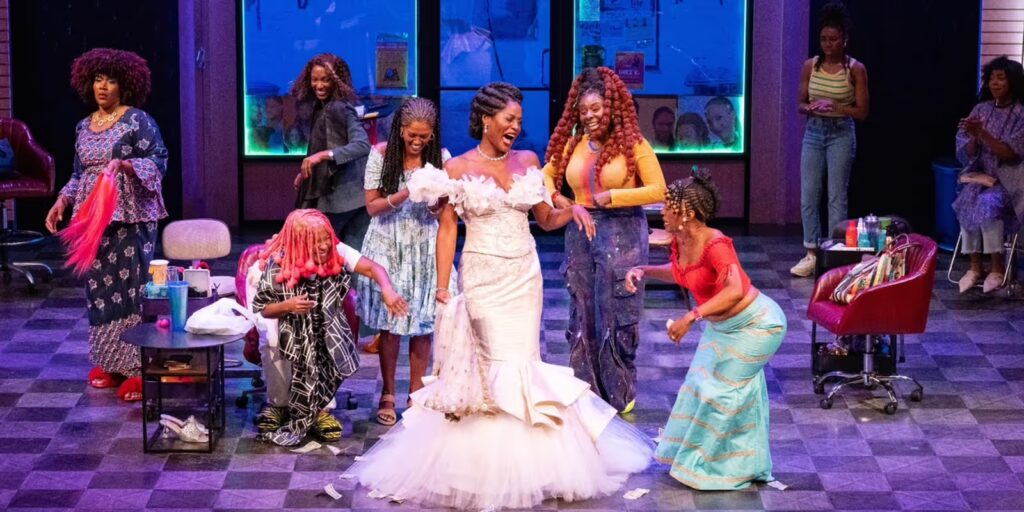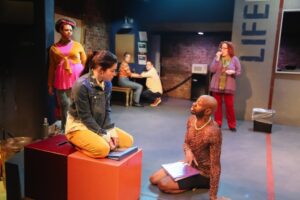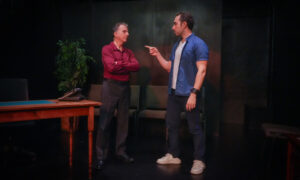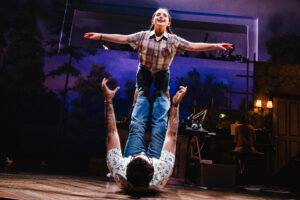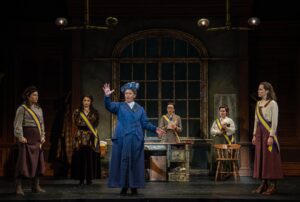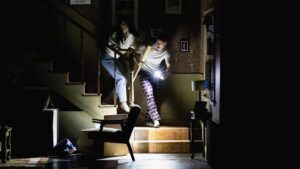Don’t let the title fool you. Although set in a salon in Harlem and ostensibly about the art of hair braiding, Jocelyn Bioh’s cleverly executed comedy brings to life the hopes, dreams, and conflicts faced by many women in today’s society. These larger than life characters presented live in a microcosm that could play out in any town in our country where people struggle to survive.
When the metal door is raised on David Zinn’s well designed set, Marie (Jordan Rice) arrives to start another day, standing in for her mother, JaJa, who is said to be getting married that day. The other operators come in and go to their stations where clients will be arriving shortly. The grande dame of the shop, Bea (Claudia Logan) makes her presence known early with complaints and theatricality that fit her larger-than-life personality. She is angry with a young operator, Ndidi (Abigail C. Onwunsli), faster and more adept at her braiding, of stealing her clients who are making new appointments with the younger woman. A confrontation occurs where a distraught client is caught in the middle of that noisy altercation.
Aminata (Tiffany Reese Johnson) has a nearby station and catches some of Bea’s wrath when she eats a fishy smelling snack nearby. We learn that Bea could have been part owner of JaJa’s, but she didn’t have enough cash to help buy the salon, and it has been a source of her bitterness and regret. Her refrain is that when she gets her own salon, things will be much different and she will not condone the behavior of the other operators. Aminata’s lazy husband arrives and charmingly wheedles $200 out of her. Michael Oloyede does a fine job of this and several other characters.
Nearby is Miriam (Debora Crabbe in this production) who is from Sierra Leone, and though very quiet and pleasant, has a story to tell of her breaking away from her home, leaving her two-year old child behind, and emigrating to the United States. Her dream is to get enough money to allow her child to join her.
Along with the stylists’ stories, we learn that Marie has her own. She has graduated from high school with honors and should be ready for college, but money and opportunity are elusive for her.
A series of clients stream into the shop. One wants to look exactly like Beyonce. Another is rude and self-important. Yet another is demanding and querulous. Melanie Brezil and Leovina Charles do a fine job in multiple roles throughout the show. One client, Jennifer (Mia Ellis), stands out as she learns about Miriam’s story and spends the whole day observing the group.
The women live in limbo, always concerned about their immigrant status, and we learn the backdoor ways they had to employ to arrive here. At the end of the day, JaJa (Victoire Charles) arrives in her bridal dress to boast of her coming marriage to a person who will take her away from the drudgery of her current life. Marie has not been a fan of this man, and her gut feeling foretells the sad resolution of the story.
Wig, hair, and makeup by Nikiya Mathis are dazzling, and some start-to-finish braids cleverly and mysteriously appear on the actors, delighting the audience. They are elaborate and intricate, giving the show its color.
Director Whitney White earns praise for the execution of each woman’s story, blending the comic elements with the underlying adversity that each faces. Though the ending seems tacked on and abrupt, and it was foreshadowed from the beginning, we admire the resilience each demonstrates when trouble arises . They stand in for the millions who try to come here for a better life and live a shadow existence. Our current political climate is a stark reminder of what they face from the methods of ICE.
Costumes by Dede Ayite add further style to the production. Lighting design by Jiyoun Chang and original music and sound design by Justin Ellington bring to life the salon and the women who populate it. Voice and dialect by Jacqueline Springfield give verisimilitude to the varying African accents.
This is a fine, talented ensemble who work seamlessly together to make believable the characters they portray. For anyone who has spent some time in salons, it is a perfect representation of the role of women who work in close proximity. In the end, these characters show us how to survive with dignity, and the characters they play linger in your mind long after the show is over.
Mark Taper Forum, Music Center, 135 N. Grand, Los Angeles. Thurs- Sun. October 1-November 9

